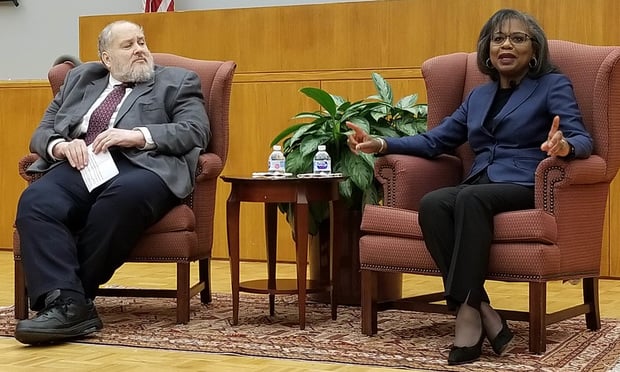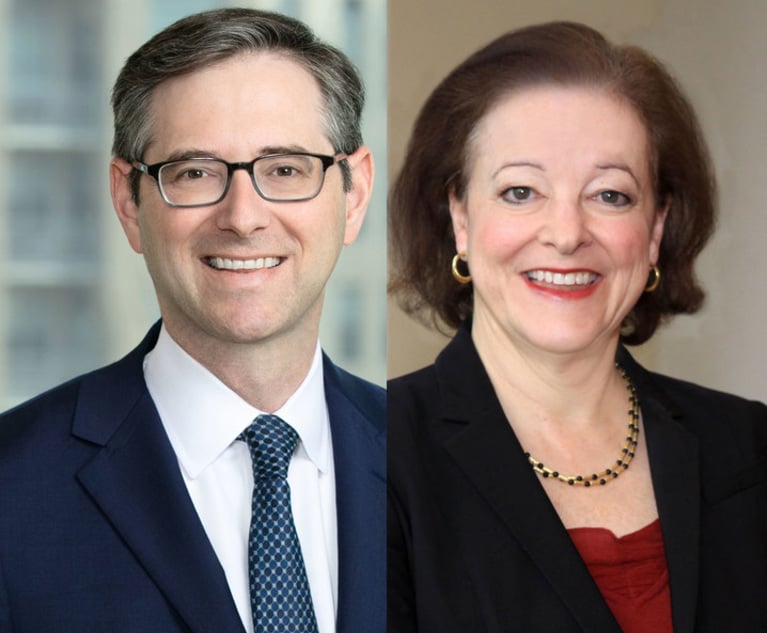Anita Hill Calls for Reforms After Kavanaugh, Thomas SCOTUS Hearings
Anita Hill, who testified at Clarence Thomas' 1991 confirmation hearing, spoke at an event in Houston Tuesday, the same day former Vice President Joe Biden expressed regret about how Hill's testimony was handled years ago.
March 27, 2019 at 03:16 PM
5 minute read
 Michael Olivas and Anita Hill at an event in Houston on March 26. (Photo: Brenda Jeffreys/ALM)
Michael Olivas and Anita Hill at an event in Houston on March 26. (Photo: Brenda Jeffreys/ALM)
Nearly an hour into a “fireside chat” at the University of Houston Law Center, Anita Hill finally got to the topic everyone had been waiting for—Justice Brett Kavanaugh's U.S. Supreme Court confirmation hearing.
Hill said confirmation hearings are really about the character of the lawyer nominated to serve on the highest court in the country. Hill, who gained fame when she testified at Justice Clarence Thomas' confirmation hearing in 1991, said the test is whether Kavanaugh “met the minimum standards of fitness to serve on the highest court.”
Kavanaugh does not meet those standards, Hill told the crowd of about 400 law students, professors and alumni at the law center event on Tuesday afternoon. During his confirmation hearing, Christine Blasey Ford accused Kavanaugh of sexually assaulting her when they were teenagers—testimony that many compared to Hill's testimony nearly three decades earlier that Thomas sexually harassed her.
Kavananugh, who was confirmed just 10 days after Ford testified, strenuously denied any form of sexual misconduct.
For 90 minutes on Tuesday afternoon, Hill answered questions posed by her friend, professor Michael Olivas, and law students. Hill is a professor of social policy, law and women's, gender and sexuality studies at Brandeis University and of counsel at Cohen, Milstein, Sellers & Toll in Washington, D.C., where she advises on civil rights issues.
She is also chairwoman of the Commission to Eliminate Sexual Harassment and Advance Equality in the Workplace, which was formed in 2017 in response to the #MeToo and #TimesUp movements and is aimed at eliminating sexual harassment and bias in the entertainment industry.
Hill said she sees parallels between her own testimony at Thomas' U.S. Supreme Court confirmation hearing in 1991 and Ford's testimony during Kavanaugh's hearing last year.
Those confirmation hearings before the Senate Judiciary Committee should be focused on the nominees' character, Hill said, and not on the demeanor of people such as her and Ford who bring misconduct allegations against them.
“It wasn't whether she was the best witness. It was whether he was the best person for that position,” Hill said, regarding Ford's testimony that Kavanaugh sexually assaulted her when they were teenagers.
In 1991, Hill testified before the Senate Judiciary Committee that Thomas sexually harassed her when he was her supervisor at government agencies. Thomas was confirmed, as was Kavanaugh. Both justices denied the allegations brought against them at their confirmation hearings.
Hill said the Senate should be modeling best practices in connection with sexual harassment allegations. She suggested it could do so by adopting rules that would allow, for instance, testimony from corroborating witnesses.
A law student asked Hill about the prospect that former Vice President Joe Biden may seek the Democratic nomination for president in 2020. Biden was chairman of the Senate Judiciary Committee when Hill testified about Thomas.
Hill said that Biden will need to respond to criticism of how he conducted that hearing, and at least show how he has changed his views.
“We should be asking these questions of all candidates,” Hill said.
The student's question was timely, because at an event in New York Tuesday evening, Biden spoke out against violence against women, condemned a “white man's culture” and said Hill should not have been forced to testify before a group of white men about her sexual harassment allegations against Thomas years ago, according to a report by the Associated Press.
The AP also reported that Biden said he regrets that he could not come up with a better way to give Hill the hearing she deserved in 1991.
Hill said her goal with the commission she chairs, known as the Anita Hill Commission, is to make changes in the entertainment industry, which she believes can be applied to other industries. That can be done, she said, because the core issue—abuse of power—is universal.
Hill said she blames lawyers in part for creating a business environment that tolerates sexual harassment.
“A lot of people say it's HR, but people in HR say the reason more is not done is the general counsel's office,” Hill said. “We need to rethink the role of general counsel.”
Hill also added that developing procedures to combat sexual harassment need to go further than risk management.
“Nothing happens in an organization until leadership takes it seriously,” she said.
Read More
Brett Kavanaugh, Neutrality Questioned, Ascends to Supreme Court
This content has been archived. It is available through our partners, LexisNexis® and Bloomberg Law.
To view this content, please continue to their sites.
Not a Lexis Subscriber?
Subscribe Now
Not a Bloomberg Law Subscriber?
Subscribe Now
NOT FOR REPRINT
© 2025 ALM Global, LLC, All Rights Reserved. Request academic re-use from www.copyright.com. All other uses, submit a request to [email protected]. For more information visit Asset & Logo Licensing.
You Might Like
View All

Eversheds Sutherland Adds Hunton Andrews Energy Lawyer With Cross-Border Experience
3 minute read
Ex-Marathon General Counsel Takes Legal Reins of Another Energy Company

After Nearly 2 Decades in the Role, Longtime Haynes and Boone General Counsel Passes the Baton
3 minute readTrending Stories
- 16-48. It’s Comp Time Again: How To Crush Your Comp Memo
- 2'Religious Discrimination'?: 4th Circuit Revives Challenge to Employer Vaccine Mandate
- 3Fight Over Amicus-Funding Disclosure Surfaces in Google Play Appeal
- 4The Power of Student Prior Knowledge in Legal Education
- 5Chicago Cubs' IP Claim to Continue Against Wrigley View Rooftop, Judge Rules
Who Got The Work
Michael G. Bongiorno, Andrew Scott Dulberg and Elizabeth E. Driscoll from Wilmer Cutler Pickering Hale and Dorr have stepped in to represent Symbotic Inc., an A.I.-enabled technology platform that focuses on increasing supply chain efficiency, and other defendants in a pending shareholder derivative lawsuit. The case, filed Oct. 2 in Massachusetts District Court by the Brown Law Firm on behalf of Stephen Austen, accuses certain officers and directors of misleading investors in regard to Symbotic's potential for margin growth by failing to disclose that the company was not equipped to timely deploy its systems or manage expenses through project delays. The case, assigned to U.S. District Judge Nathaniel M. Gorton, is 1:24-cv-12522, Austen v. Cohen et al.
Who Got The Work
Edmund Polubinski and Marie Killmond of Davis Polk & Wardwell have entered appearances for data platform software development company MongoDB and other defendants in a pending shareholder derivative lawsuit. The action, filed Oct. 7 in New York Southern District Court by the Brown Law Firm, accuses the company's directors and/or officers of falsely expressing confidence in the company’s restructuring of its sales incentive plan and downplaying the severity of decreases in its upfront commitments. The case is 1:24-cv-07594, Roy v. Ittycheria et al.
Who Got The Work
Amy O. Bruchs and Kurt F. Ellison of Michael Best & Friedrich have entered appearances for Epic Systems Corp. in a pending employment discrimination lawsuit. The suit was filed Sept. 7 in Wisconsin Western District Court by Levine Eisberner LLC and Siri & Glimstad on behalf of a project manager who claims that he was wrongfully terminated after applying for a religious exemption to the defendant's COVID-19 vaccine mandate. The case, assigned to U.S. Magistrate Judge Anita Marie Boor, is 3:24-cv-00630, Secker, Nathan v. Epic Systems Corporation.
Who Got The Work
David X. Sullivan, Thomas J. Finn and Gregory A. Hall from McCarter & English have entered appearances for Sunrun Installation Services in a pending civil rights lawsuit. The complaint was filed Sept. 4 in Connecticut District Court by attorney Robert M. Berke on behalf of former employee George Edward Steins, who was arrested and charged with employing an unregistered home improvement salesperson. The complaint alleges that had Sunrun informed the Connecticut Department of Consumer Protection that the plaintiff's employment had ended in 2017 and that he no longer held Sunrun's home improvement contractor license, he would not have been hit with charges, which were dismissed in May 2024. The case, assigned to U.S. District Judge Jeffrey A. Meyer, is 3:24-cv-01423, Steins v. Sunrun, Inc. et al.
Who Got The Work
Greenberg Traurig shareholder Joshua L. Raskin has entered an appearance for boohoo.com UK Ltd. in a pending patent infringement lawsuit. The suit, filed Sept. 3 in Texas Eastern District Court by Rozier Hardt McDonough on behalf of Alto Dynamics, asserts five patents related to an online shopping platform. The case, assigned to U.S. District Judge Rodney Gilstrap, is 2:24-cv-00719, Alto Dynamics, LLC v. boohoo.com UK Limited.
Featured Firms
Law Offices of Gary Martin Hays & Associates, P.C.
(470) 294-1674
Law Offices of Mark E. Salomone
(857) 444-6468
Smith & Hassler
(713) 739-1250






